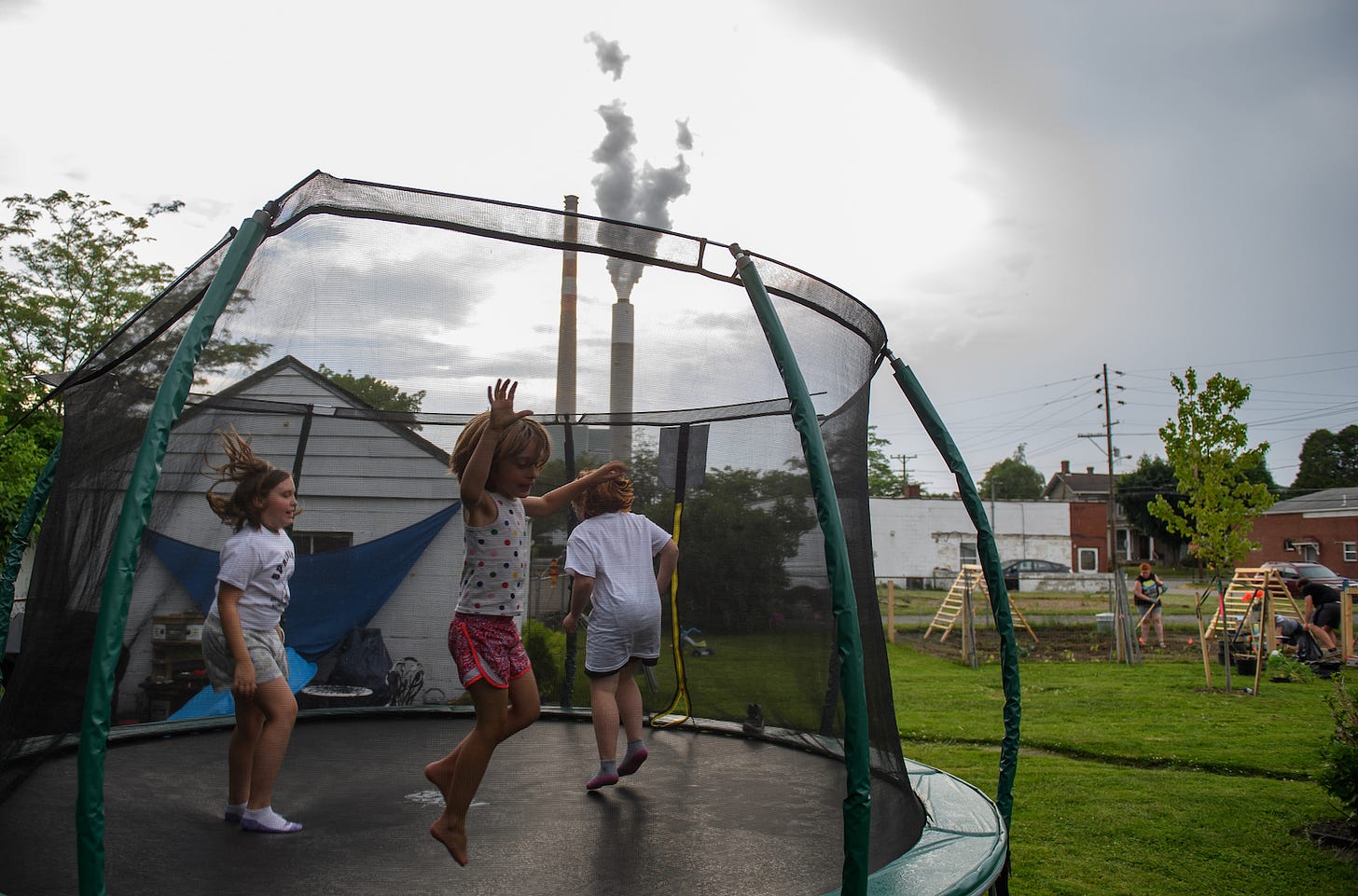The problem with Biden's new climate regulations
There's a climate justice loophole in the EPA's historic new power plant rules, according to a new analysis. Plus, some other news for the week.

Last week, President Joe Biden’s Environmental Protection Agency announced the first-ever carbon pollution regulations for existing power plants. If implemented, the rules would require coal and gas plants to cut or capture nearly all of their emissions by 2040—a big deal, considering existing power plants make up about 25 percent of the country’s climate pollution.
As such, most environmental groups and news organizations have hailed the new rules as a milestone for the clean energy transition. “This is one of the most important steps we can take to confront the climate crisis,” said Lissa Lynch, federal climate legal director at the Natural Resources Defense Council. The Washington Post called the rules a “giant step” toward meeting Biden’s climate goals.
But the EPA has also framed the rules as a win for environmental justice—and activists aren’t as sure about that. In a speech at the University of Maryland last week, EPA Michael Regan said the regulations “will bring substantial health benefits to communities across this country—especially frontline communities that have unjustly borne the burden of pollution.”
Here’s the problem: The EPA’s new power plant regulations don’t actually apply to the vast majority of gas plants in the country. According to a new analysis by Shelley Robbins, project director at the nonprofit Clean Energy Group, the rules only affect frequently-used plants over 300 megawatts: 147 plants out of a total 3,400 fossil-fuel fired plants in the U.S.
That leaves at least 61 million people, primarily in low-income communities or communities of color, living within 3 miles of a fossil fuel plant that won’t be required to reduce its emissions under the new rules, according to Robbins. These plants are known as “peaker plants”—and they are far dirtier than the large, existing baseload plants covered by the new regulations, Robbins said.
Peaker plants are only used during a surge in electricity use, or a peak period. During a heat wave in summer, for example, peaker plants in cities across the U.S. fire up to handle the demand on the grid caused by air conditioners. Because they run more intermittently, and more quickly, then tend to be less regulated and release more pollutants into nearby communities, Robbins said.
The EPA has said that rules for peaker plants may come later. EPA Administrator Michael Regan said the agency “really focused on those most egregious sources [of pollution]. Some of the smaller sources, some of those peaker plants that run less frequently, we will be thinking about how we tackle those as well,” reported E&E News. (HEATED asked the EPA for comment but did receive one as of press time).
But for Robbins, the fact that peaker plants are not included in the EPA’s power plant regulations casts a shadow over the EPA’s promise that the rules would right years of environmental injustice. We spoke with Robbins about her analysis; our Q&A with her is below.
But first…
Some climate news to start your week
Politico is hosting a fossil fuel-sponsored energy summit on Thursday—and some notable climate hawks are attending. Senator Ed Markey—a leading climate advocate who famously co-authored the Green New Deal Resolution alongside Rep. Alexandria Ocasio-Cortez—is listed as a speaker for the Politico Energy Summit, Politico’s “first-ever energy summit to explore how the U.S. is positioning itself in a complicated energy future.” The summit is sponsored by Southern Company, a coal-burning utility known for funding climate disinformation, and TC Energy, a methane gas company that falsely brands its core product as “clean energy.” White House Climate Advisor Ali Zaidi is also listed as a speaker.
Asked for comment, a spokesperson for Senator Markey told HEATED: "It’s important to Senator Markey that any conversation centered on energy policy is a rooted in climate and environmental justice, in particular for frontline communities who have for years borne the brunt of the crisis. Senator Markey’s aim is to engage in discussions about the importance of advancing bigger, bolder Green New Deal policies at the federal level so that we can safeguard our people, our planet, and our pocketbooks, all of which are adversely affected by the proliferation of fossil fuels.”In Montana, regulators are now required to ignore climate change. Amanda Eggert of the Montana Free Press reports: “Montana Gov. Greg Gianforte has signed into law a bill that bars the state from considering climate impacts in its analysis of large projects such as coal mines and power plants.” About 95 percent of the 1,000+ people who commented on the law opposed it. But the fossil fuel industry supported it, so, you know. Democracy!
Climate change puts booty at risk. That was a pirate joke—and a bad one, because this is actually fairly serious. Futurism’s Sharon Adarlo reports: “Climate change isn't just causing weird weather patterns, like stronger storms or flood surges wreaking havoc on coastal communities and infrastructure. Apparently, scientists say, we can also blame it for — we shit you not — an increase in pirate attacks in the waters off East Africa.” Adarlo adds: “It's just one more example of the sometimes bafflingly complex risks posed by a warming climate — and particularly how the carbon-spewing developed world is causing myriad problems for poorer areas that use far fewer fossil fuels.”
And now, back to our regular programming. Here’s Shelley Robbins on why the new EPA regulations don’t apply to peakers; why peakers are dirtier than other power plants; and why the exclusion of these power plants is a form of fossil fuel racism.




